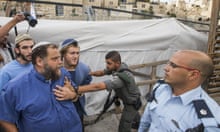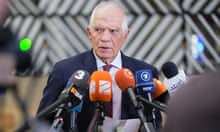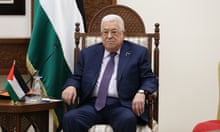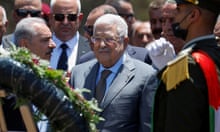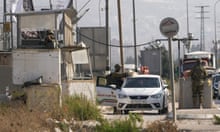It’s early morning in Jenin in the north of the occupied West Bank, but the summer sun is already hot. Shopkeeper Salih Farah is getting ready for the day, sweeping up the spent bullet cases littering the entrance to the slum-like refugee camp on the city’s western edge.
The night before, a fighter belonging to the Palestinian militant group Islamic Jihad was arrested during an Israel Defence Forces (IDF) raid on the camp; one person was killed during the operation. Close by, in the spot where Palestinian-American journalist Shireen Abu Aqleh was killed in May, beneath the murals painted in her memory there are still pools of dried blood.
“It’s the same every single night now. You can’t go outside at night without getting shot, but it’s not going to stop us living our lives,” the 52-year-old said. “Jenin is the centre of Palestinian resistance ever since the second intifada [Palestinian uprising]. The Israelis have never forgotten that … They are trying to punish us.”
The veteran Al Jazeera journalist was covering the violence when she also lost her life, most likely as the result of being shot by an Israeli sniper. Abu Aqleh is one of 25 people who have been killed in the Jenin area since the beginning of the year: the near-nightly IDF raids on the camp have become one of the biggest Israeli military operations outside wartime for two decades.
Jenin’s refugee camp is one of the largest of the 19 camps in the West Bank. It is also one of the poorest, with high rates of poverty and unemployment. Gun battles between Israeli forces and Palestinian militant groups in the camp’s narrow streets are common: although Jenin is in Area A, the 18% of the West Bank under full Palestinian control, the Palestinian Authority (PA) granted the IDF free rein to operate here during the 2000-05 second intifada.
During the eight-day battle for Jenin in April 2002, Israel used assault helicopters and armoured bulldozers to level the centre of the camp, and scores were killed on both sides in one of the bloodiest episodes of the uprising.

Unable to flush out Fatah, Hamas and Islamic Jihad militants from the camp’s labyrinthine alleyways on its own, the PA has since then welcomed the IDF’s help in clamping down on armed groups hostile to its authority.
The current IDF operation follows the worst spate of Palestinian terrorist attacks in years this spring, in which 19 people were killed. The majority of assailants came from Jenin.
Abu Aqleh was waiting for an expected raid at the edge of the camp, along with a group of Palestinian journalists – all wearing helmets and protective vests clearly marked “press” – when she was shot below the ear. Colleagues at the scene said she was hit by fire from an IDF convoy 100 metres down the road, and that no other armed forces were present when they came under fire.
Israel initially said the unit had been attacked, and Abu Aqleh was killed by armed Palestinians, but later conceded it was possible she had been accidentally shot by Israeli soldiers.
“It’s very obvious what happened to Shireen. I’m just a civilian and I can tell you that,” said Fatmeh Kasoun, 45, who lives a street over from where the journalist was killed. “Shireen came to the camp a lot, we all followed her work. She will be missed.”
The 51-year-old correspondent’s killing immediately – inevitably – became politicised. Abu Aqleh’s family, along with the UN, EU and PA, have called for an independent investigation into her death, and the Palestinians have referred the case to the international criminal court.
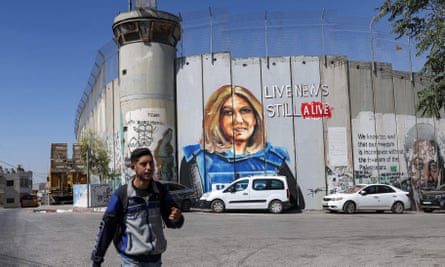
The PA previously rejected an Israeli offer of a joint investigation on the grounds of a lack of trust. Several media investigations, as well as the official Palestinian investigation, have found that the star reporter was deliberately targeted by Israeli forces.
But last week, the PA said that it had agreed to hand over the bullet that killed Abu Aqleh for forensic testing at the US embassy in Jerusalem, on the condition there was no Israeli involvement. Following the Palestinian announcement, Israeli military spokesperson Brig Gen Ran Kochav told Israeli media that the testing would be carried out by Israeli investigators in the presence of US observers.
A day later, Washington released a statement saying that “detailed forensic and ballistic analysis” determined the bullet was too badly damaged to come to a definitive conclusion on its origin, but that “gunfire from IDF positions was likely responsible” for Abu Aqleh’s “unintentional” death.
The US conclusions were met with anger and dismay by many Palestinians, who widely viewed it as an attempt to diffuse tensions between Israel and the PA ahead of Joe Biden’s visit to the region on Wednesday.
“All this stuff about focusing on investigating the bullet, the gun… It’s useless,” said Abu Khalid, a Jenin camp resident who lives on the street where Palestinian militants held a position on the morning Abu Aqleh was killed. The reporter was shot around the corner, about 150 metres away.
“It’s an insult. A fabrication. But if America says it’s the truth, then it’s the truth,” he added sarcastically.
Abu Aqleh’s family, who were not informed in advance of the US-supervised investigation, have rejected the state department’s conclusions as “assuming good faith on the behalf of a recalcitrant and hostile occupying power”, and have vowed to keep fighting for justice via an independent and transparent inquiry.
In Jenin camp, residents are looking forward to a brief respite during Biden’s visit; most people seem to think that Israel does not want to risk any renewed focus on the day-to-day brutality of occupation before the US president arrives.
There are few street lights in the camp. As night falls, a waxing moon illuminates its winding alleyways; grapes and figs, not quite ripe, hang above high garden walls pockmarked with bullet holes.
Abu Aqleh’s face looks down from posters and murals on almost every street corner, still quietly watching what will happen here next.

